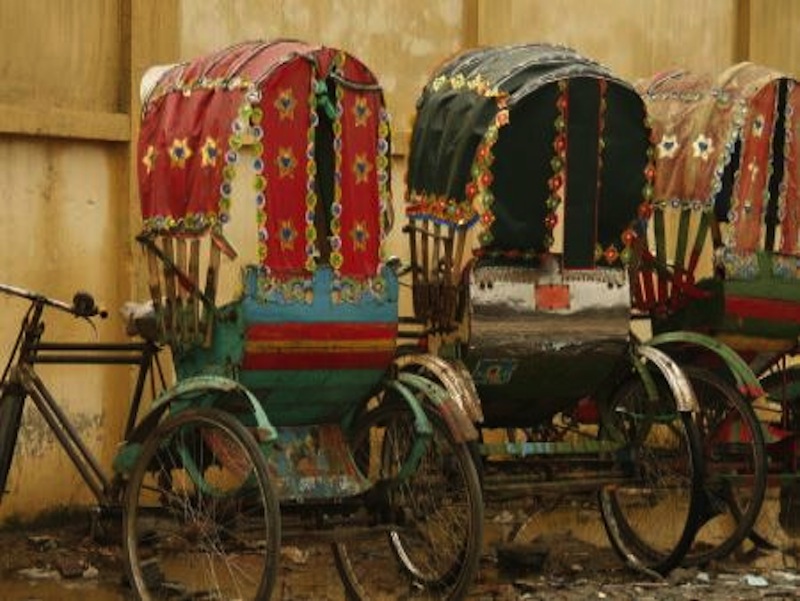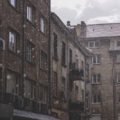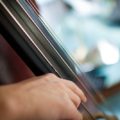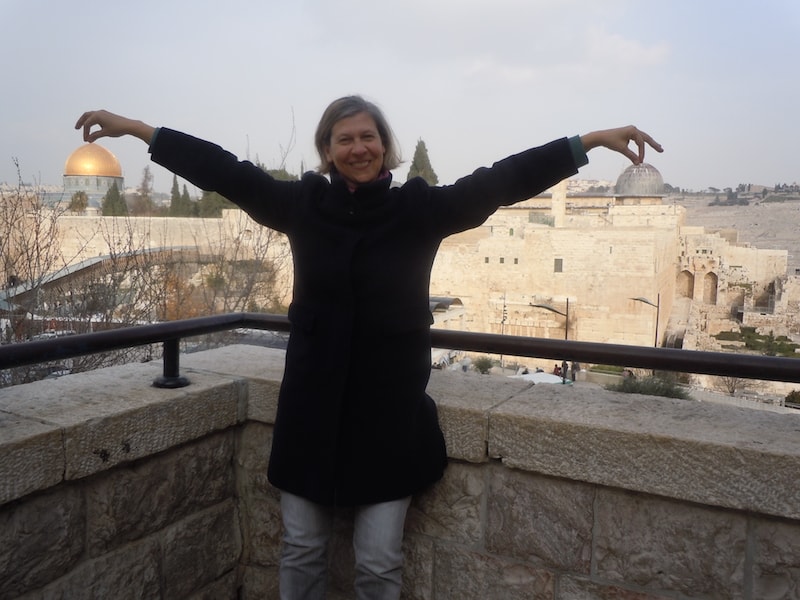
Claudiaexpat gives her personal goodbye to Jerusalem, reflecting on these past four and a half years in this charming city.
Four and a half years have passed. I can see myself on a cold January day, walking my dog in the park overlooking my house in Jerusalem. I had arrived a couple of days earlier; my son was at school, and my husband at work.
Every morning, with Mitch, I would climb the steps that took me to the Haas walk, which dominates both the whole old city and the new city. I would walk with him, feeling a bit tense, as you are when you aren’t familiar with the rules of your new surroundings, and you don’t know what to expect.
I see myself meeting a young man, who was also walking a small dog, and asking him where he was from. Spain, he said. I see myself chatting to him as our dogs sniffed each other, making friends. The young man seemed happy to meet a newcomer. He told me he was a photographer, and had joined his partner a year earlier. Cautiously, he gave me his impressions.
And on top of these emotions is a maelstrom of faces, situations, tragic occurrences – deaths, arrests, demolished houses -, personal events, encounters.
And he said something which was so much more accurate than the things so many people had felt compelled to tell me when they heard I was moving to Jerusalem. He said that here moods are a roller coaster. At times you are filled with enthusiasm and energy, mesmerized by this fascinating city and in love with Palestine, feeling a deep empathy for the place, and convinced that your fight will be enough to free this land. Then suddenly you are overwhelmed by desperation and frustration, which gnaw at you from within, wasting you away. And on top of these emotions is a maelstrom of faces, situations, tragic occurrences – deaths, arrests, demolished houses -, personal events, encounters.
At the end of my stay in Jerusalem I can say with conviction that I feel exhausted. Fulfilled but exhausted. And in addition to this feeling of extreme tiredness, there is the certitude that I will never be able to detach myself psychologically from Jerusalem and Palestine, because the trauma that hit me when I discovered what is really happening there was such a bombshell that it changed me forever.
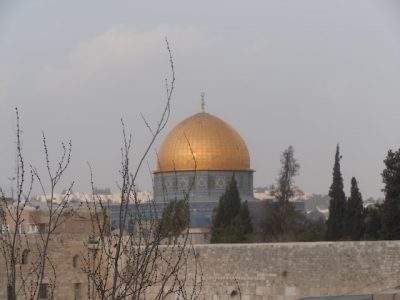 During the first few months, when I was settling in, I told people I had never felt quite as disorientated as this during a move. They were surprised: after Africa, South America, the wars in Sudan, Angola and Congo, poverty, the upheaval of coming into contact with so many extremely different cultures, how was it possible that I was so shaken up in a place like Jerusalem?
During the first few months, when I was settling in, I told people I had never felt quite as disorientated as this during a move. They were surprised: after Africa, South America, the wars in Sudan, Angola and Congo, poverty, the upheaval of coming into contact with so many extremely different cultures, how was it possible that I was so shaken up in a place like Jerusalem?
It took me months to understand it for myself. Because what happens when you live in Jerusalem is that things seep into your soul drip by drip, a myriad of intense images that scroll past your eyes as you try to make sense of them: contrasting cultures, different languages, an endless stream of uniforms and symbols, claims and counterclaims, tension and violence, so much violence, both overt and covert.
It took me a while to acknowledge that even though it was fascinating, it was psychologically heavy to be faced with two completely different situations, depending on whether you took a left or a right turn at the end of the street. Especially since you have to behave differently depending on who you are interacting with.
For all these years, when I spoke to Israelis, or French or American Jews in West Jerusalem, I was always careful not to spark conversations that were too deep, so as not to unleash in my interlocutor the inevitable need to justify the terrible occupation of Palestine by the Israelis, which would in turn force me to react with the vehemence which was mounting in my heart. So these relationships were false, not genuine, laborious. But when I spoke to Palestinians in East Jerusalem, I took pride in expressing my solidarity, in making them understand that their cause touches our hearts, and that we’re on their side.
This constant strain compounded the difficult task of passively accepting the injustice taking place before my very eyes.
it’s impossible to stay there too long, because to measure injustice, and the conspiracy of silence that goes with it, is untenable over time.
For years I was unable to speak about this injustice. Living in the only real democracy of the Middle East means that you have to be over-attentive to what you say in public, because the Israeli government could decide to label you a persona non grata, and throw you out. This rarely happens to people who are protected by well-known humanitarian organizations (although in Israel you soon learn to say ‘you can never be too careful’), but it happens to less protected people – and this self-control you are forced to exercise is another very difficult aspect of life in Jerusalem.
So for years I kept my lips sealed, and this increased the natural frustration that stemmed from not being able to invite home friends who lived in Bethlehem or Ramallah, from watching my neighbour’s home being demolished, from hearing that yet another youth, guilty of throwing a stone, had been murdered, and so on. Now that I have left Jerusalem, I am free to formulate this list. But it does little to alleviate my frustration.
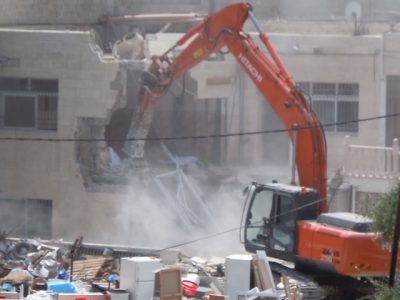 What I can say for sure, and I think many foreigners living in Palestine would agree with me, is that it’s impossible to stay there too long, because to measure injustice, and the conspiracy of silence that goes with it, is untenable over time. When you arrive it’s a shock. Then you organize yourself to be able to live with it, but deep down inside you still believe that something might change soon, because it is unthinkable that things can go on like this, or deteriorate.
What I can say for sure, and I think many foreigners living in Palestine would agree with me, is that it’s impossible to stay there too long, because to measure injustice, and the conspiracy of silence that goes with it, is untenable over time. When you arrive it’s a shock. Then you organize yourself to be able to live with it, but deep down inside you still believe that something might change soon, because it is unthinkable that things can go on like this, or deteriorate.
As the months go by, however, you witness things getting worse. Jerusalem changed enormously from when I arrived at the beginning of 2010: many houses were demolished, many shops in the Old City closed down, more and more areas were occupied, signs in Hebrew replaced ones that had been in Arabic, increasing numbers of ultra-orthodox Jews filled the streets where Palestinians live, more and more illegal buildings sprouted up in the occupied part of the city, corroding a civilization which is struggling to survive.
you can’t be happy in an occupied country, where people are suffering, where violence is bread and butter, where human savagery is so in your face.
In the end, when you realize that years have gone by and things have only changed for the worse, you feel exhausted and helpless. And you want to get out, so that at last you can speak out, to be able to shake up opinions, to be able to wear a kefia or put a Handala round your neck without feeling threatened, but above all, to try and find that normality which living in Jerusalem takes away from you. And to start afresh with new ideas for helping Palestine.
Many people, visiting from Italy or simply passing through, asked me if we were happy in Jerusalem. I always gave the same answer: you can’t be happy in an occupied country, where people are suffering, where violence is bread and butter, where human savagery is so in your face.
But I would be lying if I said I did not like the experience. I learnt so much, both about myself and about the history of the place. I met incredible people. For years my eyes were filled with beautiful images, because few cities are as spectacular as Jerusalem. I lived off a permanent adrenalin drip, I experienced solidarity as never before, with intensity, with drive. I watched my son develop into a mature and aware young man, I welcomed visitors who, perhaps in some small way thanks to us, left with a changed vision. I forged precious friendships. Living in an occupied country creates bonds that would not be easily accepted or reproduced elsewhere.
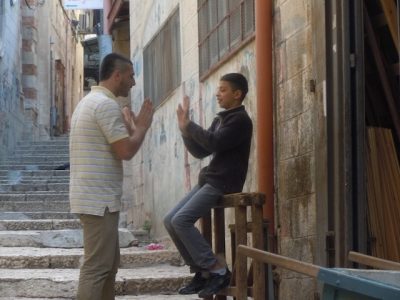 But maybe the most important gift I am taking away with me is the lesson I learnt from the Palestinian people. An amazing, open, welcoming, intelligent people, who, despite their difficult living circumstances, and the injustice they have to face, maintain their dignity, their warmth, and most astoundingly, their respect for others. A people with whom, for almost five years, I interacted daily, and who always shared a smile, an affectionate gesture, a joke, or a laugh. No one deserves to be imprisoned in their own land, but when those who have to suffer this awful fate are people who epitomize warm-heartedness and respect for others, it’s even harder to accept. And to say goodbye.
But maybe the most important gift I am taking away with me is the lesson I learnt from the Palestinian people. An amazing, open, welcoming, intelligent people, who, despite their difficult living circumstances, and the injustice they have to face, maintain their dignity, their warmth, and most astoundingly, their respect for others. A people with whom, for almost five years, I interacted daily, and who always shared a smile, an affectionate gesture, a joke, or a laugh. No one deserves to be imprisoned in their own land, but when those who have to suffer this awful fate are people who epitomize warm-heartedness and respect for others, it’s even harder to accept. And to say goodbye.
Claudia Landini (Claudiaexpat)
Jakarta, Indonesia
August 2014
Photos ©Claudia Landini
Translated from Italian by Paola Fornari

